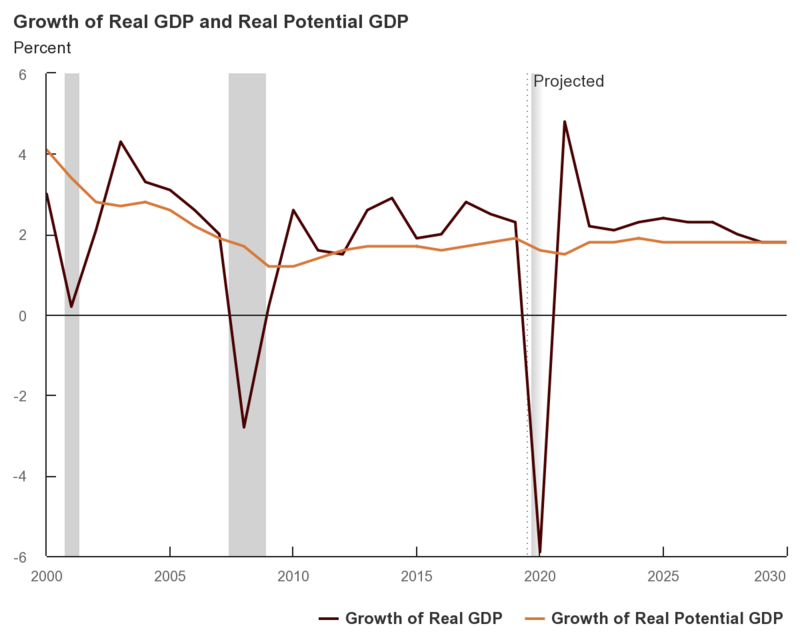The outlook for the U.S. economy is increasingly clouded by various challenges that could usher in a potential recession. As the Federal Reserve grapples with balancing interest rates, looming recession risks are highlighted by falling consumer sentiment index readings and heightened uncertainty in the markets. The recent imposition of tariffs by allied nations in response to the administration’s trade policies has exacerbated fears among investors regarding long-term economic stability. Additionally, stock market predictions are becoming more pessimistic as chaos in trade relations continues to impact financial confidence. With many U.S. businesses adopting a cautious approach amidst these volatile conditions, an in-depth analysis of the broader economic implications is warranted to fully understand the potential trajectory of the U.S. economy.
A comprehensive examination of the American financial landscape reveals a worrying trend for the nation’s economic future. Growing trade tensions and foreign tariff strategies are raising eyebrows, while the Federal Reserve faces tough choices regarding monetary policy. As consumer optimism wanes, indicated by a declining sentiment index, investors are left to ponder the possible fallout from ongoing market fluctuations. Signals from the stock exchange forecast a potentially unstable environment, posing significant challenges for various sectors. Understanding these issues is crucial for anticipating the short-term and long-term repercussions on the overall economic ecosystem.
U.S. Economy Outlook Amid Trade Tensions
The outlook for the U.S. economy is increasingly complicated by ongoing trade tensions, particularly stemming from the recent tariff impositions by major trading partners like China, Mexico, and Canada. Investors are on edge as speculation rises about the likelihood of a prolonged trade war, which many economists argue could be a precursor to a recession. The trade war challenges core sectors of the economy as tariffs raise costs on imported goods, subsequently pushing consumers to reconsider their spending habits. With the consumer sentiment index dipping to its lowest levels since late 2022, the immediate impacts of these trade policies are palpable across various industries, raising concerns about overall economic stability.
As the U.S. economy grapples with these uncertainties, the Federal Reserve is at a critical junction. With interest rates hanging in the balance, the Fed’s decision-making process becomes increasingly vital to reversing negative economic trends. If consumer confidence continues to falter, the Committee may opt for an aggressive approach to interest rate cuts, hoping to stimulate spending and investment. However, the persistent threat of inflation looms large, creating a delicate environment where the Fed must balance efforts to nurture economic growth against maintaining price stability.
Frequently Asked Questions
What is the current outlook for the U.S. economy given the recession risks?
The current outlook for the U.S. economy suggests growing recession risks, primarily due to factors such as escalating trade tensions and declining consumer sentiment. Recent surveys, like the University of Michigan’s consumer sentiment index, indicate a significant drop in economic confidence, which heightens concerns over a potential economic downturn within the next year.
How might the impact of tariffs affect the U.S. economy outlook?
The impact of tariffs on the U.S. economy outlook is largely negative, as economists warn that they could lead to diminished investment and increased uncertainty. A prolonged trade war could exacerbate recession risks by lowering consumer and business confidence, potentially stalling economic growth.
What role do Federal Reserve interest rates play in the U.S. economy outlook?
Federal Reserve interest rates are a critical factor in shaping the U.S. economy outlook. The Fed faces challenges in balancing rate cuts to stimulate growth against the risk of rising inflation. Current market instability, driven by trade wars and other economic factors, complicates their decision-making process.
Are stock market predictions indicating a positive outlook for the U.S. economy?
Stock market predictions currently do not point to a positive outlook for the U.S. economy, as recent losses have raised concerns about the resilience of financial markets. Analysts are cautious, given the potential for further declines linked to rising recession risks and ongoing trade disputes.
How does the consumer sentiment index reflect the U.S. economy outlook?
The consumer sentiment index is a key indicator of U.S. economy outlook, with recent declines suggesting waning consumer confidence. Falling sentiment may lead to reduced spending, which is essential for economic growth and can serve as an early warning sign of a potential recession.
| Key Point | Details |
|---|---|
| U.S. Economy Outlook | The current outlook indicates increasing risks of a recession due to several factors including trade wars and lower consumer confidence. |
| Market Reaction | U.S. markets have experienced heavy losses following tariff impositions by trade partners in response to U.S. tariffs. |
| Consumer Sentiment | The University of Michigan’s consumer sentiment index is at its lowest level since November 2022, indicating waning economic confidence. |
| Impact of Tariffs | Economists, including Jeffrey Frankel, argue that tariffs generally harm the economy, affecting investment confidence adversely. |
| Potential Risks of Recession | Five key risks identified include trade wars, stock market crashes, severe cuts in government spending, fiscal crises, and increasing perceptions of risk. |
| Federal Reserve’s Dilemma | The Fed must balance between supportive rate cuts for economic growth and potential inflation control, with a likelihood of maintaining current rates. |
Summary
The U.S. economy outlook is currently fraught with uncertainty as looming risks, including trade wars and declining consumer sentiment, pave the way for potential recessionary pressures. As economists express concerns about the impacts of tariff policies, it is evident that the ongoing tension in international trade and domestic economic measures could shape the U.S. economic landscape significantly in the coming months. Investors and policymakers alike must brace for a period of unpredictability as the Federal Reserve navigates complex challenges in their monetary policy approach.
